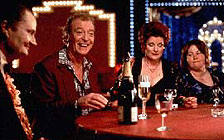|
|
|
|
Little
Voice
|
 |
|
One of the laws of popular cinema – particularly today – seems to be this: if a film has a couple of big, rousing scenes, usually involving a public triumph, then it has a chance at box office success. There is just something about set-pieces in which an underdog shines through, in a contest or on a stage or even in a courtroom, that brings out the populist glow in most of us. Shine (1996), Babe (1995), The Full Monty (1997) and The Castle (1997) are just a few of the movies that have, knowingly or not, activated this principle. Little Voice has one scene of this sort. It is an extended highpoint in which LV (Jane Horrocks), a hitherto mute, shy, downtrodden lass, struts upon a stage miming old favourites by Judy Garland, Marilyn Monroe and the like – and the crowd of locals goes wild with applause. This points to an oddly Pavlovian aspect of contemporary cinema hits: audiences, it appears, love to have fun watching other audiences on screen having fun. Beyond this single, stirring scene, Little Voice has nothing. It is unbelievable, incoherent and utterly contrived. It tries to bolster its premise with pathos: LV pines for her dear, departed, saintly Dad, and can only sing on stage when his ghost is there to beam beatifically at her. It hints at a romance: LV's closest soulmate is another sensitive dreamer, Billy (Ewan McGregor), obsessed with raising pigeons. It aims at an edifying Personal Journey for all decent people – some lame moral about finding yourself, naturally. There is not a single move in this film which is not predictable from the first couple of minutes (or even simply the trailer). Director Mark Herman again seeks (as he did in Brassed Off, 1996) to balance the feel-good premise against a downbeat, social milieu. In this instance, his focus is not so much the world of work or communal relations, but the tawdry arena of small-time show biz, and especially the spirit-destroying potential of a working class family. LV is terrorised by her unlovely, foul-mouthed, pushy mother, Mari (Blenda Blethyn). It is a grotesque role: Mari's essential fault seems to be, in the eyes of the filmmakers, her libido – or else her taste for Tom Jones records and "Disco Inferno". Blethyn is an actor who needs not awards but a restraining order – she is way over the top from her first line onwards. For perhaps half of the film, Michael Caine as Ray, the entrepreneur who stumbles across LV and puts her on stage, gives this movie a modicum of charm, grace and wit. But once the big performance is over, Little Voice suffers badly from what can be called the Toto the Hero (1991) syndrome. Suddenly, for almost no reason, there is drama, flames, life in peril, and ordinary characters turning into pantomime villains. It is a film that depends solely upon an emotional response – since it makes virtually no appeal to reason, logic or common sense. The very idea that LV – essentially a walking sampler machine, with nothing but a gift for mimicry – could be groomed as a star with blockbuster appeal is a piece of nonsense. The build-up to LV's big show – where nothing resembling a rehearsal between the singer and her big band is even glimpsed – exposes the speciousness of this hook. I do not doubt that Little Voice, for all its pretence and blather, has the capacity to move and please large viewing crowds. It is often said these days (mainly by film distributors) that critics are out of touch with the tastes of the average audience. If that is sometimes so, there is a simple reason: critics, on the whole, tend to value films which have more than one good scene in them. Is that too much to ask or expect? MORE Herman: Purely Belter © Adrian Martin January 1999 |
![]()